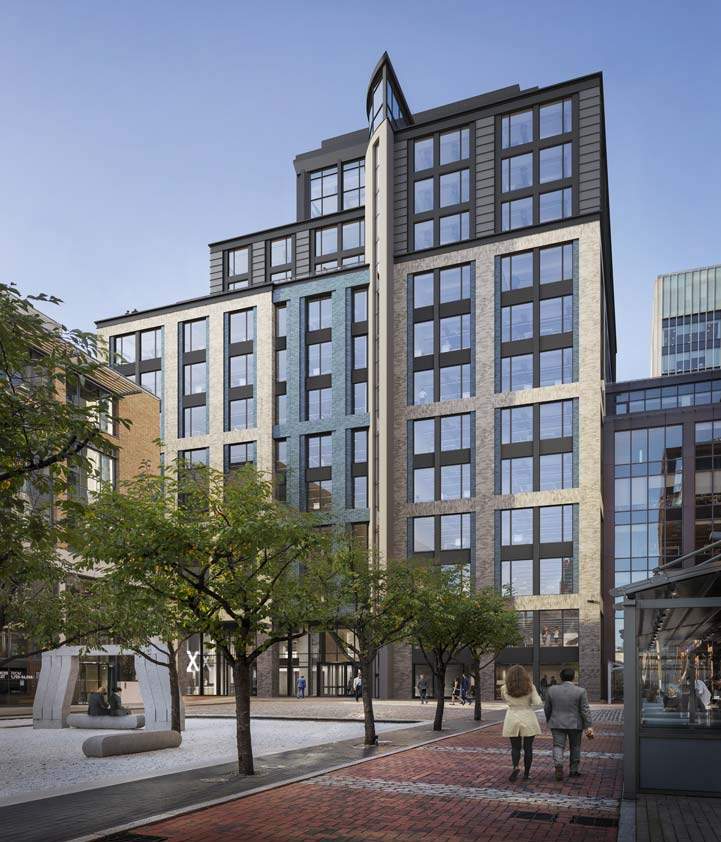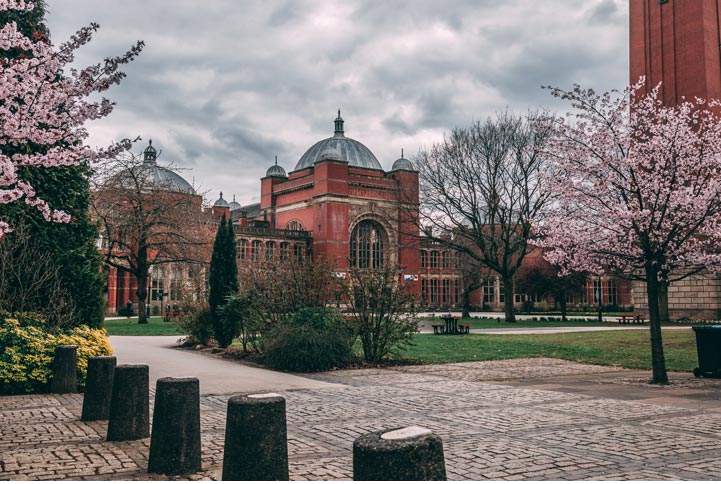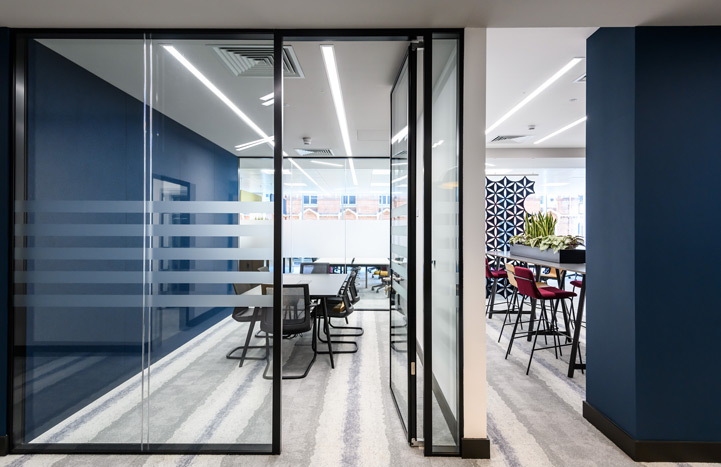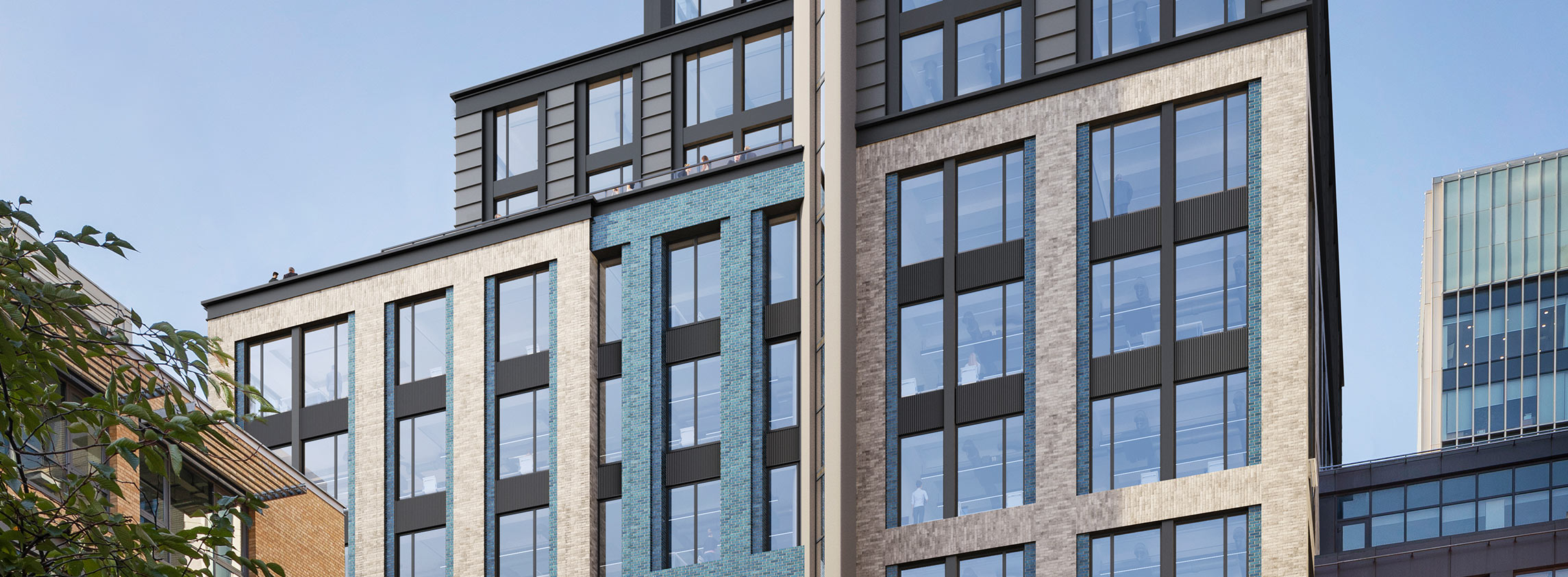For economic and social success, cities need to create places where people love to be, whilst nurturing the people who live in them – it is in these ways that cities can build connected communities
Green space at Brindleyplace
For economic and social success, cities need to create places where people love to be, whilst nurturing the people who live in them-it is in these ways that cities can build connected communities. The idea that a building can have a far-reaching impact on a community is pivotal and widely recognised by assessment methods such as GRESB and BREEAM.
As soon as the idea of Brindleyplace began to take shape in 1993, it was set on a path to fulfil these aims by creating a thriving, community-driven, high-density, economically successful commercial scheme. It was the very first regional, mixed-use development of any scale, not just in Britain, but also in Europe.
When the concept of Brindleyplace was first developed, there were key considerations about how the workspace integrated with the surrounding environment, which is more relevant today than ever in meeting the needs of modern businesses, their employees and their environmental objectives.
Community and collaboration continue to be key going forward, and it is essential that private and public work together to create places within the city to foster well-being and inclusivity, creating safe and accessible spaces and nowhere is this more relevant than at Brindleyplace. Looking to the future, 10 Brindleyplace, which reaches completion in Q1 2023, will deliver a new generation of BREEAM outstanding, ESG-focused office space.

10 Brindleyplace, Birmingham
From urban grey to urban green
As an industry, we tend to focus on the kilograms of CO2 and the kilowatt-hours our properties emit that our buildings consume, or what could be termed ‘carbon tunnel vision’. However, there is so much more. The concept of ‘social value’ is used more and more by commercial real estate companies to measure the impact that properties have on local communities and society. Relationships are key. The best and most effective way to make the office an integral part of people’s lives is by designing in connection. Office buildings must become more than simply a space to work – but a place to build connected communities, both within and outside our offices. With businesses seeking to attract and retain the best staff, the building and space they occupy now serve as a key talent magnet.
The concept of social value is used more and more
Though there is a huge emphasis on redesigning the office post-pandemic – it isn’t all about buildings – the spaces between the places also have an important role to play in creating the best human experience.
In order to promote well-being, developers are now starting to increase the provision of green space in and around their office buildings. The multitude of benefits of spending time outside are well-documented. Nature is essential to both our physical and mental well-being. The Brindley estate can boast a unique setting spanning 17 acres, which includes three public squares, waterways, and ample open space. Throughout the year, occupiers benefit from a range of seasonal activities accessible right on the doorstep, all maximising use of outdoor spaces and encouraging a diverse set of uses, while also encouraging a sense of place for all. The estate works with the Canal & River Trust to maximise the opportunities along the waterways around the estate as places for recreation and leisure, exercise and transport. The estate will have a key role to play in tempting both workers and visitors back into the city centre.
Universities are promoting innovation and growth in Birmingham

University of Birmingham – Photo by Korng Sok on Unsplash
Universities play a unique role in business start-up support. They not only finance incubators to support start-ups and contribute to their survival and growth, but these incubators are also managed by the university alongside spin-outs with other local businesses.
Universities have started to become more and more entrepreneurial in their outlook, and companies now have a greater appreciation for the expertise of academic researchers and how that can contribute to their business success. This can be achieved through offering free desk space through initiatives such as The STEAMhouse incubator which provides entrepreneurs, start-ups and early-stage businesses with support and resources that can be otherwise difficult to access – there's also the University of Birmingham’s BizzInn, a free incubator for hi-tech innovators or companies that need specialist facilities or expertise to develop or grow their business. This includes access to networks, investors and mentors, as well as co-working space alongside other businesses and experienced professionals.
The B Start-Up programme offers alumni and students the support to start and run a business, after graduation or during university. The scheme is supported through the university’s B-Enterprising service. Birmingham City University’s BCU Advantage is a business support service to help start-ups achieve their goals through collaborations with BCU experts, business specialists and recruitment professionals who also work with several partner organisations and funding bodies.
The StartUp Society, created through the University of Birmingham, also brings together students interested in entrepreneurship or have a business or an idea for a business. The system provides a platform for students to share ideas, network and generate value. The purpose is to encourage the spirit of entrepreneurship and the creation of start-ups at the university.
How Birmingham is paving the way for tech start-ups
The West Midlands has been named the country’s fastest-growing tech sector and according to a new government report, the region has been recognised as a top performer for digital growth and is predicted to create an additional 52,000 roles in the sector over the next four years - a bumper increase of 55% since 2019. Tech growth in the region grew by an average of 7.6% a year between 2014 and 2021, the fastest region in the UK. Going forward, it is expected to generate at least £2.7 billion for the local economy by 2025.
Taking talent
UK tech businesses are growing twice as fast as non-digital businesses, with Savills data showing that there is a tendency for technology companies to acquire more space than they had before the Covid-19 pandemic began. With exciting start-ups and highly skilled talent coming out of the universities, Birmingham has proven to be a highly successful ecosystem for these high-growth tech companies.
Birmingham has a generous pool of young people to hand, with nearly 40% of its population under 25 years old and over 9,000 students graduating from Birmingham universities in subjects related to science and tech
Clare Bailey, Director, Commercial Research
Start-ups and scale-ups tend to attract younger demographics and Birmingham has a generous pool of young people to hand, with nearly 40% of its population under 25 years old and over 9,000 students graduating from Birmingham universities in subjects related to science and tech.
Tech leads the way in Birmingham
2021 saw the annual total of VC raised for Birmingham increase by 144% to £86m, which is the highest level since our records began. To the end of November this year, we have recorded over £67m – 42% above the five-year average. This overall level of capital raised, which will impact positively on real estate demand and the company’s growth, will further establish the Birmingham technology ecosystem going forward. According to Dealroom data, there are more than 1,200 start-ups that call the West Midlands home, operating in sectors such as meditech, digitalisation and manufacturing.
Entrepreneurial city – Number one in the UK for start-ups (2020)
In fact, at 54% Birmingham has seen the biggest growth in start-ups (2008- 2020) in the big 6. Among them are three unicorns – privately held companies valued at $1bn or more. They include Solihull-based e-commerce athletic wear company Gymshark and Alcester-based meditech business Quanta Dialysis Technologies.
The occupier view: the reasons behind x+why's move to Brindleyplace
Flexible workspace provider x+why has opened its doors for the first time outside of London with the launch of its Birmingham offices. In its past life, the area was one of the centres for industrial trade and commerce due to its proximity to the canal network. The new name, ‘Foundry’ looks ahead to Birmingham’s future as it reinvents itself as a centre of modern business and commerce.
.jpg)
Previously designed as an office space, x+why has avoided needlessly multiplying the building’s carbon footprint by upcycling, refreshing, and injecting a new spirit and character
Creating partnership
Landlord Hines has partnered with x+why to operate the first, second and third floors at 6 Brindleyplace, which provide a fully serviced and managed environment. A truly successful ecosystem is a network of interconnected corporations and start-ups, engaging as a collaborative community to sustain and grow with the partnership between Hines and x+why is an example of how landlords are now accommodating the needs of the changing workplace.
The Foundry at 6 Brindleyplace offers workspace, 6,000 sq ft of breakout areas, and amenities, including Peloton bikes and an on-site barista. This flexible, amenity-driven space is helping to meet the growing demand for flexible workspace for businesses within Birmingham, as well as offering existing tenants at Brindleyplace adhoc spillover space within the scheme.
As the company looked to expand out of London, it was important for them to choose locations which gave the best opportunity to meet their targets and provide spaces which went beyond only providing space in which to work. Birmingham was a natural choice – it‘s a young city with a new generation of professionals moving out of London – and, importantly, attracting the next generation of entrepreneurs and impact-driven startups.
Creating a sustainable community
There are only a few B Corp-certified businesses in Birmingham which presented a fertile ground for x+why to really make an impact and drive the move towards more sustainable business practices in the city. Community is at the heart of their member proposition, where they truly believe that more can be achieved through collaboration and learning from others. They host regular member socials to encourage networking and community – these include weekly breakfasts, member clinics as well as wider cultural programmes.
Brindleyplace represents growth and innovation – it‘s undergoing a resurgence, and x+why saw the opportunity to make it a hub for entrepreneurship and sustainability within Birmingham. Foundry was a fantastic choice, as it is already at the centre of a thriving community within Brindleyplace.
Previously designed as an office space, x+why has avoided needlessly multiplying the building’s carbon footprint by upcycling, refreshing, and injecting a new spirit and character
Clare Bailey, Director, Commercial Research
Foundry itself used to be a co-working space, so it presented an interesting challenge for x+why – how do you reinvent the space and create new value in a sustainable and responsible way?
Part of being a B Corp-certified business means creating products that prioritise the environment. For them, that meant building and renovating flexible workspaces that help to protect the natural resources around us.
Previously designed as an office space, x+why has avoided needlessly multiplying the building’s carbon footprint by upcycling, refreshing, and injecting a new spirit and character, while keen to make it feel like an x+why space as well as reflect the beauty of the city back to the businesses in the building.
But they also wanted to be sensitive to waste. They simply could not gut the place and start again! Deciding that they were going to work towards the coveted SKA rating early in the process helped to guide their decisions when it came to refitting the space sustainably. They worked with Useful Studio to ensure the highest sustainability standards were achieved.
The growing attractiveness of Cat A+ space in Birmingham
Post-pandemic, the office market continues to evolve and experience structural change with increased demand for lease flexibility and growth in the flexible workspace sector, especially for the many occupiers who are not yet ready to make long-term decisions. Fitted ‘Cat A+’ space offers a solution for occupiers seeking something in between a serviced office and conventional space, and has continued to grow in popularity across the key regional cities with landlords delivering fully fitted spaces of up to 10,000 sq ft.
As early as 2018, CEG was offering this type of opportunity at Alpha in Birmingham, with fully fitted suites from 1,500 up to 7,000 sq ft. More recently, the delivery of landlord-fitted space has picked up pace with schemes such as Interchange, Southside Building and Oozells Building at Brindleyplace, all now providing occupiers with the opportunity to take fully fitted spaces.
It’s easy to see why Cat A+ holds such appeal – not only does it save an occupier from incurring significant upfront capital expenditure, it reduces delivery risk and saves time – a crucial factor for the many businesses that want to move quickly through the acquisition process.
From a landlord perspective, this alternative specification can speed up leasing velocity with a diversity of product offering appealing to a wider demographic of potential occupiers. Fitted space will also typically offer a rental uplift for the landlord, evidenced by schemes such as at Interchange where fitted spaces have achieved a 30% rental premium over the traditional headline rent.
The market for conventional space continues to dominate, particularly for larger occupiers; however, CAT A+ offers benefits to all and looks to be a workplace trend that is well placed for further growth.

Cat A plus space has stimulated demand from a wider occupier demographic, helping to increase leasing velocity
